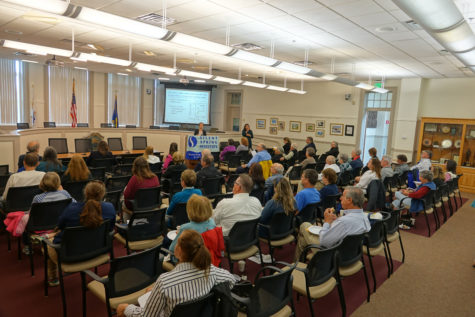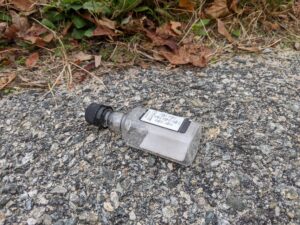
The Silent Spring Institute held a public forum Wednesday in Hyannis to discuss a proposed study to test children for highly fluorinated chemicals in drinking water and their possible health impacts.
HYANNIS – The Silent Spring Institute is seeking federal funding to conduct a study which would test children in Hyannis for exposure to highly fluorinated chemicals and their potential impacts.
The Hyannis Water System exceeded federal levels of PFOS and PFOAs last spring.
The contaminants which entered the Hyannis water supply have been traced back to the use of firefighting foams used at the Barnstable County Fire and Rescue Training Academy and Barnstable Municipal Airport.
A do-not-drink order was issued last spring before actions were taken to reduce the levels in tap water, but questions remain about possible health risks from previous exposure.
The highly fluorinated chemicals have been linked to a range of health effects, including cancer and reproductive and developmental toxicity.
“Our study would involve testing the levels of these highly fluorinated chemicals in the blood of children and looking to see whether children with the highest levels of these chemicals in their blood have any effects on their immune system,” said Laurel Schaider, a research scientist with the Silent Spring Institute.
A public forum was held yesterday at Barnstable Town Hall to discuss the proposed study and present experiences from other communities which have seen similar contamination of their drinking water.
“At this point we are looking for feedback from the community so that we can design a study that is responsive to community concerns.”
Courtney Carignan, a research fellow at Harvard T.H. Chan School of Public Health, said the goals of the study are to determine the impacts of child immune function, develop an online network to provide data and resources to affected families and facilitate connections between communities.
“The proposed study is to test whether children with higher blood levels of PFOS from AFFF contaminated drinking water produce fewer antibodies to diphtheria and tetanus and whether they’d be more likely to have clinical relevant suppression of antibody production,” Carignan.
One way to conduct the study is to conduct two blood samples from each child. Blood would be drawn before the children receive a diphtheria and tetanus booster shot. The second blood test would then be taken about a month later.
“What this allows us to do, having two blood samples, is to calculate the change in antibody level,” Carignan said. “By establishing first a baseline before doing the vaccination, it reduces the amount of noise in the dataset so we are better able to detect an effect of PFAS on antibody level.”
A second design would be to take just one blood test after vaccination.
“This approach may have more noise because you don’t have the sort of comparison of pre-booster to compare it to,” Carignan said. “So we may be less able to detect an effect and we may need to include a lot more children in the study in order to have a similar result.”
Schaider said a proposal for federal funding from the National Institute of Environmental Health Sciences will be submitted in July.
“We would hear in early 2018 whether we would receive the funding,” Schaider said. “If the study is funded we would be able to start next year.”
If funding is obtained any residents would be free to participate in the study, which would start sometime in 2018.
























